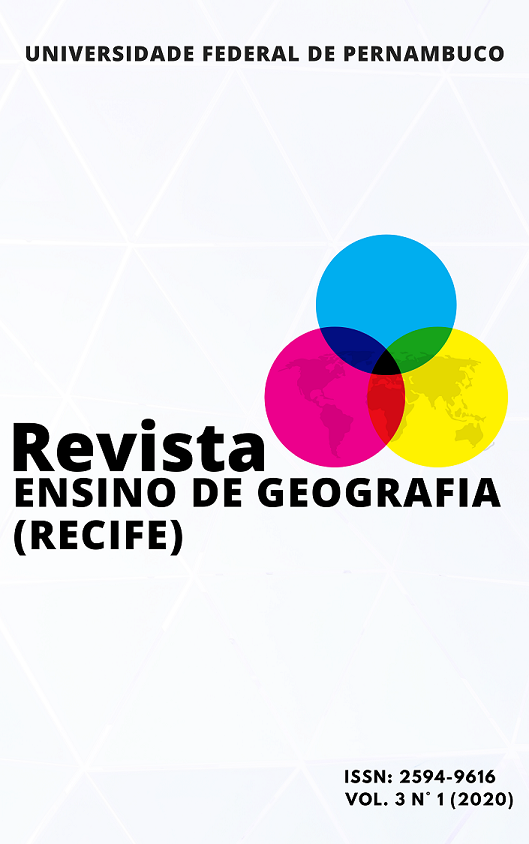Geography in the final years of elementary school: an analysis of public and private education in the municipality of Patos-PB
DOI:
https://doi.org/10.51359/2594-9616.2020.244690Keywords:
Geography teaching, teaching networks, Elementary schoolAbstract
The knowledge related to Geography is very significant for the understanding of the current world, however, it is seen that that this knowledge has different treatments when analyzing their applicability in public and private schools. This article sought to identify the difficulties faced by Geography teachers in these two school systems regarding the transmission of geographical knowledge. In order to this, an exploratory research was carried out through the application of questionnaires in 10 educational institutions, 5 public and 5 privates. It was noticed that Geography teachers from public school face structural problems such as the lack of didactic resources and social problems such as the absence of the family in the school environment. In this regard, several authors such as Kaercher (2010) talk about a methodological change on the part of teachers, but it turns out that they have other challenges that present greater difficulties to be overcome. It is concluded, therefore, that the disparity between the public and private schools in elementary education in the municipality of Patos-PB is not due to the incapacity of teachers, but rather due to a scarcity of resources that help in the development of classes, making them more dynamic and attractive
References
ASSIS, Maria Cristina. Metodologia do Trabalho Científico. São Paulo, 2009.
BRASIL. LDB – Leis de Diretrizes e Bases da educação nacional. Lei nº 9.394. de 20 de dezembro de 1996. 14. ed. Brasília: Câmara dos Deputados, Edições Câmara, 2017.
BRASIL. Secretaria de Educação Fundamental. Parâmetros curriculares nacionais: introdução aos parâmetros curriculares nacionais / Secretaria de Educação Fundamental. – Brasília: MEC/SEF, 1997.
BRASIL. Base Nacional Comum Curricular (BNCC). Educação é a Base. Brasília, MEC/CONSED/UNDIME, 2017. Disponível em: < http://basenacionalcomum.mec.gov.br/images/BNCC_EI_EF_110518_versaofinal_site.pdf >. Acesso em: 26 mar.2017.
CALLAI, Helena Copetti. Estudar o lugar para compreender o mundo. In: CASTROGIOVANNI, Antonio Carlos (Org.) Ensino de geografia: práticas e textualizações no cotidiano. 7ª ed. Porto Alegre: Mediação, 2009.
CAVALCANTI, Lana de Souza. Geografia, escola e construção de conhecimentos. 10 ed. São Paulo: Papirus editora, 2010.
IBGE. INSTITUTO BRASILEIRO DE GEOGRAFIA E ESTATÍSTICA. Divisão regional do Brasil. Rio de Janeiro: RJ. Disponível em: https://biblioteca.ibge.gov.br/index.php/biblioteca-catalogo?view=detalhes&id=2100600 Aceso em: 26 mar.2017.
KAERCHER, Nestor André. Desafios e utopias no ensino de Geografia. 3. ed. Santa Cruz do Sul: EDUNISC, 2010.
PORTAL QEDU. Número de escolas em Patos. Disponível em: https://www.qedu.org.br/busca/115-paraiba/4043-campina-grande. Acesso em 26 mar. 2020.
SUERTEGARAY, Dirce Maria Antunes. A expansão da pós-graduação em Geografia e a ANPEGE. Revista da ANPEGE. Rio Grande do Sul. v. 1, n. 01 (2003).
Downloads
Published
How to Cite
Issue
Section
License
Copyright (c) 2021 Antonio Izidro Sobrinho

This work is licensed under a Creative Commons Attribution 4.0 International License.
Authors who publish with this journal agree to the following terms:- Authors retain copyright and grant the REVISTA ENSINO DE GEOGRAFIA (RECIFE) right of first publication with the work simultaneously licensed under a Creative Commons Attribution NonCommercial International 4.0 (CC BY-NC) that allows others to share the work with an acknowledgement of the work's authorship and initial publication in this journal.
- Authors are able to enter into separate, additional contractual arrangements for the non-exclusive distribution of the journal's published version of the work (e.g., post it to an institutional repository or publish it in a book), with an acknowledgement of its initial publication in this journal.
- Authors are permitted and encouraged to post their work online (e.g., in institutional repositories or on their website) prior to and during the submission process, as it can lead to productive exchanges, as well as earlier and greater citation of published work.



